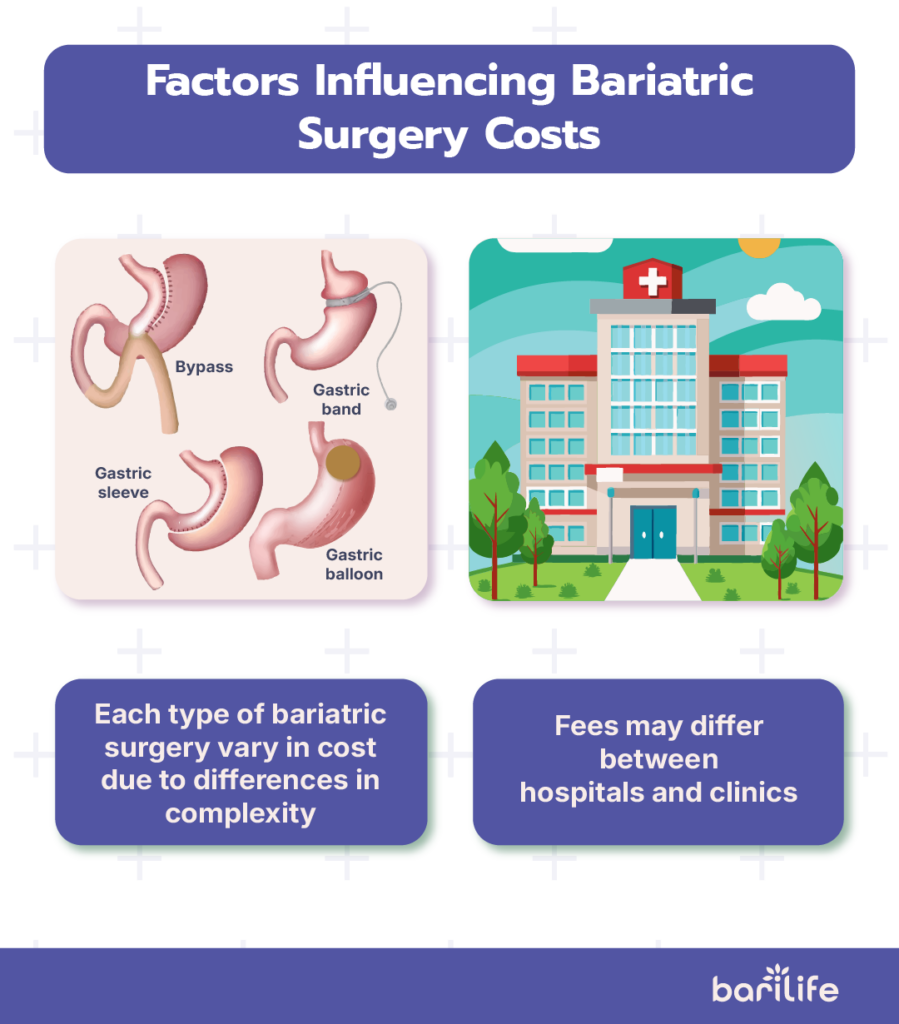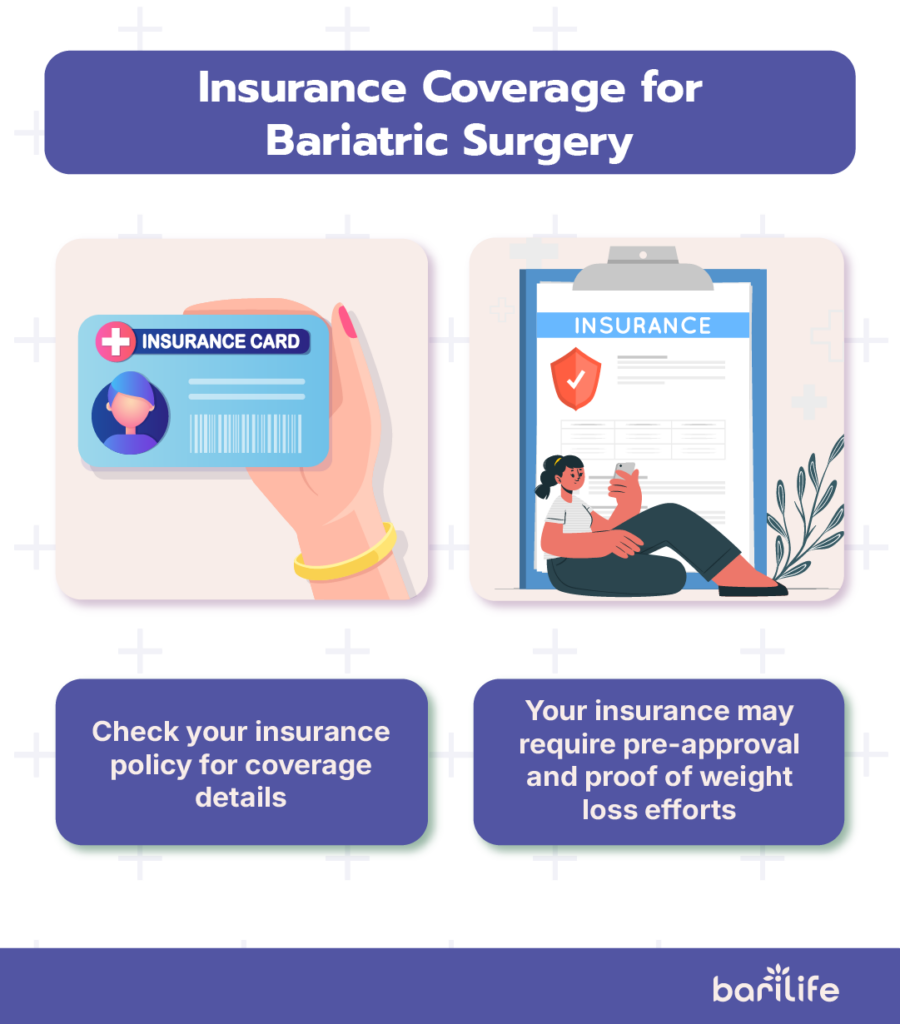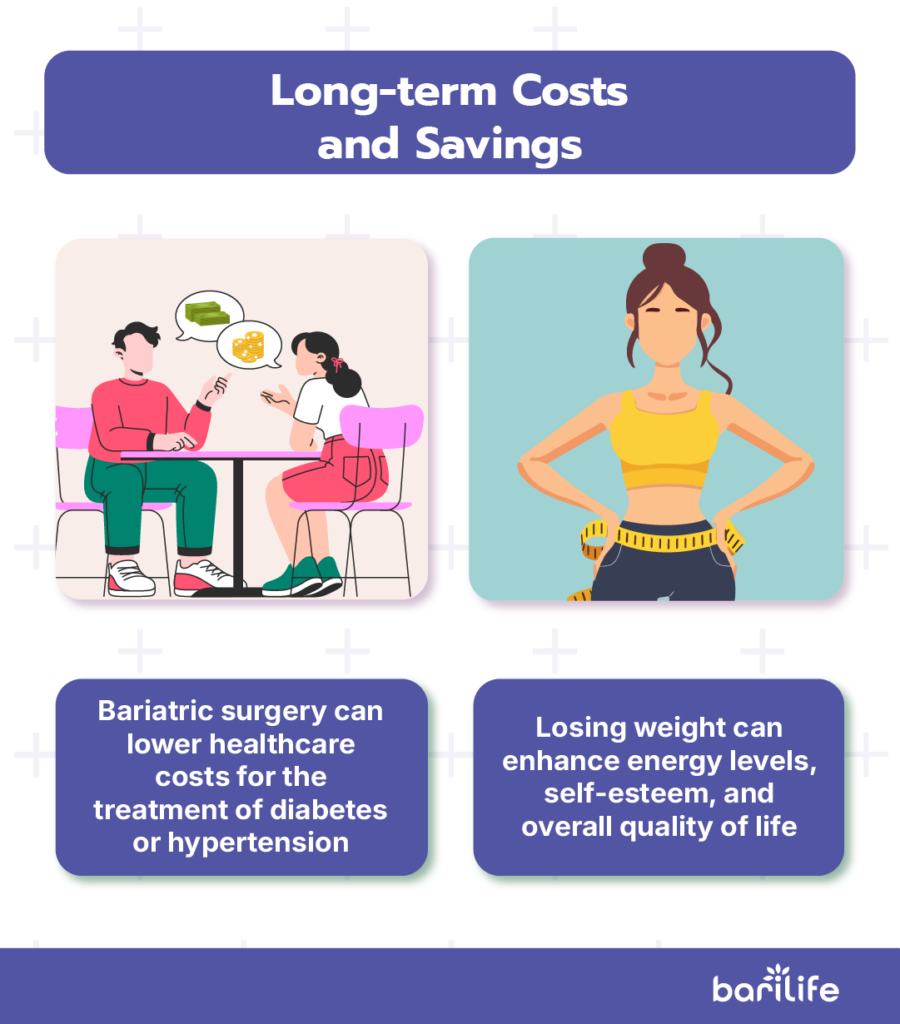Cost is a key factor in deciding to have bariatric surgery. Many factors affect the cost. Some procedures cost much more than others. To estimate a procedure’s total cost, we’ve outlined key factors. They include price, average costs, insurance, financing, and hidden costs. We also cover long-term expenses and savings, including costs like bariatric vitamins which patients might need post-surgery.
Table of Contents
Factors Influencing Bariatric Surgery Costs
Many factors play a role in the cost of bariatric surgeries. Each type of bariatric surgery can vary in cost due to differences in complexity, duration, and equipment used. Because gastric bypass involves extensive rerouting of the intestines, it is generally more expensive compared to the other bariatric procedures.
Hospital and surgeon fees are another cost associated with bariatric surgery. Some factors that can increase these costs are the location and reputation of the hospital, as well as the surgeon’s experience and credentials.
Additional fees for pre- and post-operative care include pre-surgery consultations, post-surgery follow-ups, and tests such as blood work and nutritional panels to help ensure successful outcomes.For those undergoing a secondary procedure, the cost of bariatric revision surgery might be higher due to the complexity involved.

Average Costs of Common Bariatric Procedures
On average, gastric bypass costs around $23,000, with cost varying depending on the facility and surgeon. It involves more complex rerouting of the digestive system, which contributes to its higher cost.
A sleeve gastrectomy costs between $8,600 and $14,000. This procedure is less complex as it does not require rerouting of the intestines.
Adjustable gastric banding or a reversible bariatric surgery costs around $12,000, this procedure is often the least expensive due to its simplicity.
These costs include the procedure, hospital stay, and follow-up care, but they exclude any pre-surgical consultations and unforeseen post-surgery medical complications that could require additional costs.
Insurance Coverage for Bariatric Surgery
Insurance coverage for bariatric surgery varies by provider, as each company has its own policies that determine the extent of coverage. Each insurance company has a “certificate of coverage” that will outline the health benefits under the specific plan. Generally, most insurers will cover the procedure if there is clear evidence that the patient’s body mass index (BMI) is negatively affecting their health. Candidates for bariatric surgery who are more likely to receive insurance coverage often require a BMI of 40 or higher, or a BMI of 35 or higher with an obesity-related health condition such as diabetes.
Getting bariatric surgery is not as simple as going through with the procedure and losing weight. Most often, there are pre-approval requirements in place by the insurance company in order to be covered. The insurance company may make the patient prove that they have attempted to lose weight through a non-surgical weight loss program. It is also common for insurance companies to make the patient receive psychological testing in order to ensure that they understand the long-term requirements of the procedure.
Consider the out-of-pocket costs, as insurance companies vary in coverage.

Financing Options for Bariatric Surgery
There are different options available when considering financing for bariatric surgery. A medical loan can be applied for which may have lower interest rates compared to traditional loans. Loans can vary from $1,000 to $100,000 with a wide range of term-length. These loans typically allow up to ten years for repayment.
Health Savings Accounts and Flexible Spending Accounts are tax-advantaged accounts meaning that it can help cover the cost of bariatric surgery while offering tax advantages, reducing the financial burden.
Additionally, payment plans are offered by many hospitals and bariatric clinics to patients without insurance, which allows patients to spread the cost over several months or years. These payment plans often have minimal or no interest. .
Potential Hidden Costs
Outside of the procedure and hospital stay, there are potential hidden costs that could increase the overall price. Complications such as post-surgery infections or hernias may require additional surgeries.
In many instances, lifelong vitamin and mineral supplementation is necessary after bariatric surgery to prevent deficiencies, especially with altered nutrient absorption.
Patients need to factor in costs for products like bariatric vitamins, bariatric multivitamins, bariatric vitamins for hair loss, and bariatric multivitamin with iron to avoid nutrient depletion. It’s also essential to consider dietary changes, such as incorporating bariatric protein shakes and bariatric protein bars into daily meals for optimal recovery.
Bariatric surgery requires lifestyle adjustments such as regular physical activity and dietary adjustments. It is easy to overlook, but there will be expenses associated with fitness programs or gym memberships, as well as new clothing that might be needed after weight loss.
Long-term Costs and Savings
While bariatric surgery can be expensive, there are various ways to make it more affordable. Moreover, the long-term savings can justify the cost. Individuals with obesity-related health conditions often face higher medical expenses across all areas of care, including inpatient, outpatient, and prescription medications. By addressing conditions such as diabetes, hypertension, and sleep apnea, bariatric surgery can lead to significant long-term savings in healthcare costs.

Weight loss can open the door for improved employment opportunities, as it enhances physical mobility and energy levels. Additionally, weight loss improves overall quality of life. Weight loss can improve mental health by enhancing self-esteem and reducing pain associated with conditions such as arthritis.
Bariatric surgery offers numerous benefits that often outweigh the initial cost, particularly when considering the long-term improvements in health and quality of life. Developing a personalized payment plan, whether through insurance, financing options, or savings, can help alleviate the financial burden, making the investment more manageable and accessible.
Conclusion
Bariatric surgery costs vary depending on the procedure, with gastric bypass being the most expensive due to its complexity, while sleeve gastrectomy and gastric banding are more affordable. Insurance coverage depends on the provider, often requiring proof of medical necessity, such as a high BMI or related health conditions. Financing options, including medical loans, HSAs, and payment plans, are available to help manage costs.
Hidden costs, such as complications and long-term needs like Bari Life bariatric vitamins, should be considered. Despite the upfront cost, bariatric surgery can lead to long-term savings by reducing obesity-related health issues, improving quality of life, and creating better career opportunities.




What are your tips and tricks to post-bariatric success?